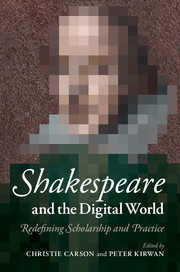Book contents
- Frontmatter
- Contents
- Notes on contributors
- Acknowledgements
- Shakespeare and the digital world
- Part I Defining current digital scholarship and practice
- Part II Defining current digital scholarship and practice
- 5 Internal and external Shakespeare
- 6 Shakespeare at a distance
- 7 ‘All great Neptune’s ocean’*
- 8 ‘From the table of my memory’*
- Half-time: A pause for reflection
- Part III Redefining the boundaries and practices of Shakespeare studies online
- Part IV Redefining the boundaries and practices of Shakespeare studies online
- Index
- References
8 - ‘From the table of my memory’*
Blogging Shakespeare in/out of the classroom
Published online by Cambridge University Press: 05 July 2014
- Frontmatter
- Contents
- Notes on contributors
- Acknowledgements
- Shakespeare and the digital world
- Part I Defining current digital scholarship and practice
- Part II Defining current digital scholarship and practice
- 5 Internal and external Shakespeare
- 6 Shakespeare at a distance
- 7 ‘All great Neptune’s ocean’*
- 8 ‘From the table of my memory’*
- Half-time: A pause for reflection
- Part III Redefining the boundaries and practices of Shakespeare studies online
- Part IV Redefining the boundaries and practices of Shakespeare studies online
- Index
- References
Summary
Introduction
As the preceding chapters in this section have demonstrated, scholarly practices in the higher education classroom have undergone a significant series of shifts in response to the digital revolution, bringing new opportunities and new challenges. The ability to teach undergraduate students from digital facsimiles of original Shakespeare quartos, to call up digitised performances, to display web materials from the latest production at Shakespeare’s Globe or to ask students with laptops and tablets to conduct in-class research, opens up a seemingly infinite range of possibilities. Yet with increased opportunities come increased expectations. As an anecdotal example, following success in finding a copyright-approved system (the quite wonderful Box of Broadcasts) that would allow me to embed two complete Shakespearean films on my department’s virtual learning environment to support a module on Screen Shakespeares, I was pulled up short by student evaluations criticising the fact that the remainder of the module’s films were unavailable.
The challenges of an on-demand culture extend beyond the expectation – natural to my students, foreign to me – that the Shakespeare movies I teach should be freely and legally available online at all times, or that world-class theatre should be available at convenient stops on the number 34 bus route between campus and Nottingham city centre (it often is but, inevitably, rarely at times conducive to student utility for essays). What we are still catching up with pedagogically is reflection on how the entire learning culture of students is changing, particularly in the light of Web 2.0 technologies. Christine Greenhow, Beth Robelia and Joan E. Hughes (2009) very usefully summarise the literature in this area, drawing attention to the fact that the vast majority of pedagogic literature on web technologies has responded to the Web 1.0 model, the internet of the 1990s and early noughties which was a predominantly read-only resource. The students who are now entering higher education are the Web 2.0 generation, used to a read-and-write internet, and to producing content as well as absorbing it.
- Type
- Chapter
- Information
- Shakespeare and the Digital WorldRedefining Scholarship and Practice, pp. 100 - 112Publisher: Cambridge University PressPrint publication year: 2014



